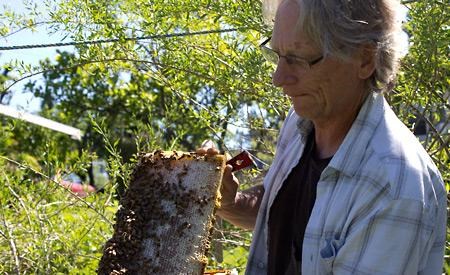With blueberries nearly ripe and blackberries in full bloom, Powell River’s bees are having a bumper season and local beekeepers are already harvesting early spring honey.
While concerns in Ontario have led to increased regulation for neonicotinoids, here on the Sunshine Coast—with small mixed agriculture rather than large single crop fields—local beekeepers, market gardeners and cooks are taking their lessons straight from the hive about how to keep the environment and bees healthy and happy.
“I am grateful every day that I work with bees and get to share in their honey sweetness,” said Doug Brown, owner of Wildwood U-Pick and Apiary.
Standing in his Wildwood market garden, which is filled with blueberries, potatoes and surrounded by flowering blackberries, Brown laments his lack of flowers. “I should do more to plant things to make the bees happy.”
With 15 hives at home, and bees bustling to and fro carrying precious nectar, it’s hard to imagine that Brown’s bees are not well cared for—especially with hives full of honey, the first time Brown said he has seen a spring crop in all his 35 years of beekeeping.
Now, Brown is spreading the sweetness on to the six apprentice beekeepers he has taken under his wing.
One of those apprentices is Wendy Devlin, a member of Powell River Farmer’s Institute and also a gardener in Wildwood.
“[Doug’s] been nicknaming us a co-op and [he] is our resident mentor,” said Devlin, who was also lucky enough to see a spring honey crop this year.
For Devlin, who was instrumental in starting off Powell River’s Seedy Saturday, Powell River’s rich bee harvest is due, in part, to the rich forage available.
“This is a very small agricultural area, but it is very good for bees,” said Devlin. “The bees are not just gathering from one farm, the bees are gathering from the local neighbourhood, the forest. There’s just so much for them to get.”
Also under the spell of bees’ bounty is Angelo Prosperi-Porta. Now a chef, the former Wildwood resident grew up surrounded by the rich produce of his family’s garden.
“We grew everything in the backyard, we always raised a couple of pigs...we always had chickens, rabbits, pigeons or geese,” he said.
Known for running Coopers Cove Guesthouse in Sooke, Prosperi-Porta was in town recently to celebrate the release of his second book, Honey, and he has a lot to say about the value of what he calls “nature’s sweetest secret ingredient.”
“I find myself coming full circle, back to what I grew up with, and keeping the recipes basic and simple,” he said.
Filled with recipes, the cookbook also includes some drawn from his Powell River childhood, like Melati, a fried doughnut dipped in warm honey.
“The reason I wrote the book was to give people a little history of hives and what it takes to produce honey,” said Prosperi-Porta. “Not a lot of people stop to think about what it took to get that honey and how fragile it is.”
He has just returned from a cooking trip in Nunavut where he served the crew maintaining the North Warning System, the line radar stations monitoring the polar regions. He drew a comparison between bees and the early warning stations.
“Kind of like the canary in the coal mine, the bees are the canary in the garden, as their colonies are collapsing and bees are dying off and disappearing,” he said. “That is a sign, a pretty clear sign, that there is something wrong. If the bees are suddenly killed off by pesticides, that could wipe out thousands of colonies in one swoop.”
Prosperi-Porta, who describes his own beekeeping adventures as “short and sweet,” recommends trying all sorts of honey from local producers.
“You are going to find a lot of variety that way,” he said. “You are going to taste a lot of honeys and decide where you want to use those in a recipe. I encourage everybody to experiment with honey.
“Without bees we probably wouldn’t have about a third of the fruits and nuts and vegetables and the sort of things that we use every day,” he said. “One bee in its whole lifetime will produce about a teaspoon of honey. So to get a jar of honey, there’s a lot of little lifetimes in there.”
For Sally Burke, president of Sunshine Coast Beekeepers Association and a retired nurse, bees are also a wonder and a gift.
“Bees work together and are all so devoted,” she said. “It’s an incredible lesson to me in community. It’s unbelievable how they work and that’s what intrigues me: the life of the bee. I love it.”
A beekeeper in Roberts Creek for about four years, Burke said anti-weed sprays are just as harmful as pesticides and she hopes, through education and outreach, people will stop using these products.
“All of the herbicides that people want to spray on their garden are just terrible,” said Burke. “If we stop to educate the public about what it really does to the bees then I think we are far [further] ahead.”
Burke, who helps organize an educational bee yard at the Botanical Garden in West Sechelt, encourages all those interested in and knowledgeable about bees to keep a bee-friendly garden and to share what they know.
“For me it’s utterly fascinating, watching and learning about bees and their society,” she said. “I feel like they are my teachers every time.”
Bee-friendly events
• Powell River Garden Club is sponsoring a bee-themed float in this year’s Sea Fair Parade, Saturday July 25, with bee-costumed mascots.
• This month BCSPCA is encouraging people to plant a bee-friendly garden as part of its Year-long Million Acts of Kindness campaign. For more information readers can go to millionacts.ca.
• A bee-friendly garden requires seeds and it just so happens that the Buzzing Gardens campaign run by Bees Matter, a partnership of agricultural organizations, is mailing out free seeds to registrants. For more information readers can visit beesmatter.ca.



